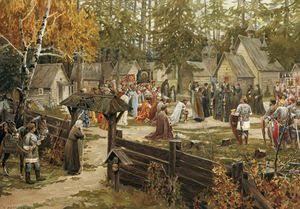What do you think?
Rate this book


355 pages, Paperback
First published January 1, 1877

" إن نصف روسيا يموت جوعاً وكتاب الأدب في موسكو يريدون ان يدخلوا الطريقة القديمة المدرسية في أساليب الأدب، وأندية الطلبة قد أُوصدت، والجواسيس مبثوثون في كل مكان، والظلم قد عمّ وطّم ، والأكاذيب والخيانة بألوانها وضروبنا ، والخديعة والغش واللؤم والسفالة"



—From a Farmer's Notebook.
"To turn over virgin soil
it is necessary to use a deep plough
going well into the earth,
not a surface plough
gliding lightly over the top."